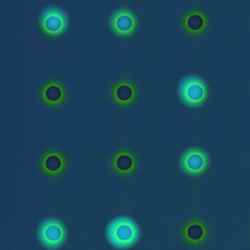Professor Madhavi Krishnan
Winner: 2020 Corday-Morgan Prize
University of Oxford
For the invention of a ‘field free’ trap for confining and manipulating a single colloidal particle or molecule, enabling accurate and precise measurements of molecular charge in aqueous solution.
Celebrate Professor Madhavi Krishnan
#RSCAwards
A microscopic bit of matter in solution is in continuous motion. Pummelled at random by the solvent, it engages in a randomly directed walk that will eventually take it far away from where it was first observed. At the nanoscale, even gravity is too weak to influence the trajectory of the object, however, placing surfaces in the vicinity puts new forces into play.
By appropriately tailoring the geometry of the walls, Professor Krishnan’s research group is able to harness these intrinsic object–wall forces and manoeuvre their entity of interest into a desired spatial location and orientation in a fluid. Once there, the object levitates stably for long periods.
The group are pioneering the use of the "electrostatic fluidic trap" in order to realise new experiments in the spatial control, manipulation, and measurement of nanoscale matter in solution. Their primary focus is on biological molecules such as proteins and DNA. Using this new approach to trapping molecules they have developed a way to measure the electrical charge of a single biomolecule in solution with high precision.
Not only does this new measurement technique open up hitherto unforeseen avenues in fundamental science, but the technological implications for society are significant. The electrostatic fluidic trap provides a new technological platform for highly sensitive and precise measurements of small changes in biomolecular properties that could be central to the diagnosis and detection of disease states and may therefore make a significant contribution to diagnostic and biomedical detection approaches of the future.
Read full biography


